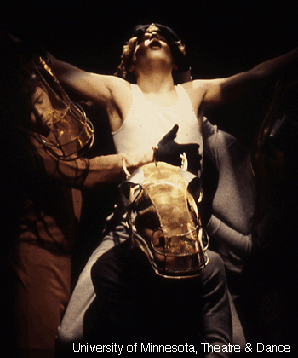JUDITH: The idea for our essay grew out of my two-fold frustration with the field of musical theater studies. First, I had experienced/read bias against what I considered to be one of the most significant shows in contemporary musical theater history, Rent. Specifically, one editor of a prominent journal rejected an article I had written on Larson’s Pulitzer Prize-winning musical primarily on the grounds that he did not like the show (it was subsequently published elsewhere), and I read about and heard similar reactions against it. Clearly not everyone echoes such sentiment, and Rent has been the subject of increasing scholarly attention. But I still felt that its complexity and significance remained unexamined.
Second, I was growing increasingly frustrated with my inability, as a theater historian, to explore all aspects of this multivalent, interdisciplinary form, particularly music and dance. The most rewarding conferences I was attending, in terms of gaining new knowledge, were not theater conferences but musicology conferences. I found myself eager to enhance my scholarship on musicals with the knowledge of a musicologist. I was aware of Jessica’s work and had met her at one of those conferences, so asking her to join me in exploring Rent was a no-brainer. Luckily she accepted. Finding a dance historian to join us proved impossible, largely due to the lack of dance scholars focusing on musical theater dance. Perhaps that was for the best, as the first draft of our collaboration was over double our word limit! I am unsure how we could have fit in ideas about the dance in the show.
JESSICA: I was thrilled to accept Judy’s invitation to co-author this chapter, for two reasons (besides the fact that I admired her work and enjoyed meeting her at conferences!). First, I had been having a similar experience to Judy’s: the most fruitful and stimulating musical theater conferences have recently become those that purposely combine scholars from a range of disciplines, resulting in a discussion that brings all sorts of methodologies, backgrounds, and perspectives to the table. Musical theater in the world of musicology is a friendly, interesting, and growing field – but we all know that we can’t do this work alone and we’re all actively seeking voices coming from other directions. How can any one scholar know everything about theater, music, dance, design, and more? My second reason, then, for jumping on board is that musicals are collaborative processes, which means there is no reason why the scholarship on them shouldn’t also be collaborative. Conferences are one model, but Judy’s invitation to write with her became an example of the philosophy we both share: that even published, “formal” scholarship can be (boldly, transparently) collaborative, conversational, and interdisciplinary.
{ 0 comments }

